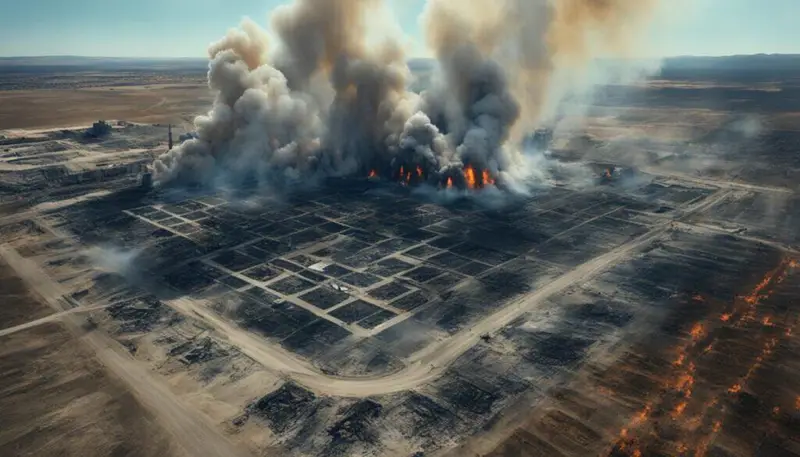Genesis, the first book of the Bible, contains numerous accounts of God’s judgment. From the Great Flood that wiped out all life on earth to the destruction of Sodom and Gomorrah, these events are pivotal moments in biblical history.
But have you ever questioned the significance and implications of these acts of judgment?
How do they shape our understanding of God and His relationship with humanity?
Let’s delve into 10 examples of God’s judgment in Genesis and explore their profound lessons.
Key Takeaways:
- The consequences of deceit: The curse on the serpent.
- Expulsion from paradise: Adam and Eve’s banishment from the Garden of Eden.
- The consequences of fratricide: Cain’s punishment.
- Divine intervention: The Great Flood and Noah’s ark.
- The wrath on sin: The destruction of Sodom and Gomorrah.
Uncover the significance of these judgments and their lasting impact on human history. Are these acts a reflection of divine justice or something more profound than we’ve considered? Join us as we delve into the depths of these stories and find answers to these thought-provoking questions.
The Curse on the Serpent (Genesis 3:14-15)
In Genesis 3:14-15, we witness a significant act of judgment by God. As punishment for deceiving Eve, God placed a curse on the serpent and outlined the consequences of its actions.
“Because you have done this,
Curse are you above all livestock
and above all beasts of the field;
on your belly you shall go,
and dust you shall eat
all the days of your life.
I will put enmity between you and the woman,
and between your offspring and her offspring;
he shall bruise your head,
and you shall bruise his heel.”
This curse on the serpent serves as a reminder of the consequences of deceit and disobedience. The serpent was condemned to crawl on its belly, a depiction of its lowered state. Additionally, God introduced enmity between the serpent and the woman’s offspring, symbolizing the ongoing conflict between humanity and the forces of evil.
These verses highlight God’s justice and the severity of the punishment for those who deceive and manipulate others. The curse on the serpent in Genesis 3:14-15 foreshadows the ongoing battle between good and evil throughout biblical history.
This image visually represents the curse on the serpent, depicting its reduced state and the enmity between the serpent and humanity.
Expulsion from the Garden of Eden (Genesis 3:22-24)
After their disobedience, God banished Adam and Eve from the Garden of Eden to prevent them from eating the tree of life. This marked a significant act of God’s judgment.
God’s Judgment and Mercy
When Adam and Eve ate the forbidden fruit from the tree of knowledge of good and evil, they brought sin into the world and disobeyed God’s command. In response, God expelled them from the paradise of the Garden of Eden to protect them from the consequences of their actions.
“…lest he reach out his hand and take also of the tree of life and eat, and live forever.”
God’s intention in expelling them from the Garden was to prevent them from eating from the tree of life and living forever in a sinful state. By doing so, God demonstrated His judgment on their disobedience and showed mercy by limiting the extent of their fallen existence.
This expulsion from the Garden of Eden serves as a pivotal moment in the Bible, highlighting the consequences of human disobedience and God’s righteous judgment. It also reveals God’s desire to protect His creation from eternal separation from Him.
The Loss of Paradise
As Adam and Eve walked out of the Garden, they left behind the perfect communion they had enjoyed with God and the abundant provisions of the Garden. They were now faced with the toil and hardships of a fallen world.
The expulsion from the Garden of Eden serves as a reminder of the devastating consequences of sin. It underscores the importance of obedience to God’s commands and the need for redemption and reconciliation with Him.
| Key Points | Explanation |
|---|---|
| The expulsion from the Garden of Eden | Serves as a judgment on Adam and Eve’s disobedience and a means to protect them from eternal separation from God. |
| Preventing access to the tree of life | Limits the extent of their fallen existence and serves as a reminder of the consequences of sin. |
| Loss of paradise | Highlights the hardships faced by Adam and Eve in a fallen world and emphasizes the need for redemption and reconciliation with God. |
Cain’s Punishment (Genesis 4:9-16)
In the book of Genesis, we come across a significant event that showcases God’s judgment in the form of punishment for the actions of Cain. This punishment serves as a reminder of the consequences that follow disobedience and the severity of God’s judgment.
Genesis 4:9-16 recounts the story of Cain, who, out of jealousy and anger, murdered his brother Abel. Upon discovering the crime, God confronts Cain, asking where his brother is. Cain responds with a callous remark, denying any responsibility for Abel’s well-being.
Immersed in anger and guilt, Cain receives his punishment from God. We read in Genesis 4:11-12:
“So now you are cursed from the ground, which has opened its mouth to receive your brother’s blood from your hand. When you cultivate the ground, it will no longer yield its strength to you; you will be a wanderer and a drifter on the earth.”
God’s punishment for Cain is threefold. First, he is cursed from the ground, symbolizing a loss of productivity and fertility. The earth, once yielding its bounty to Cain, now withholds its abundance as a consequence of his sin.
Second, Cain is condemned to be a wanderer and drifter on the earth. He will never find a settled home or a place of rest. This punishment reflects God’s judgment on Cain’s actions, ensuring he must face the consequences of his crime for the rest of his life.
Lastly, Cain expresses his fear of being killed by others who may seek revenge. In response, God places a mark on Cain, assuring him of divine protection from immediate harm.
This account of Cain’s punishment serves as a chilling reminder of the consequences that follow acts of violence, disobedience, and a lack of repentance. It underscores the righteous judgment of God, who holds individuals accountable for their choices and actions.
As we reflect on this story, let us recognize the importance of obedience, mercy, and the pursuit of righteousness in our own lives. Let us strive to avoid the path of Cain and seek reconciliation with God and others.
Key Lessons from Cain’s Punishment:
- Disobedience leads to consequences and divine judgment.
- Violence and anger have severe repercussions.
- Repentance and seeking reconciliation are essential.
- God’s judgment is just and reflects His righteousness.
Let us take heed of these lessons as we navigate our own journeys and seek to align ourselves with God’s will.

| Punishments for Cain | Meaning |
|---|---|
| Cursed from the ground | Loss of productivity and fertility |
| Wanderer and drifter on the earth | No settled home or place of rest |
| Divine mark for protection | Assurance of safety from immediate harm |
The Flood (Genesis 6-8)
When we examine the book of Genesis, one of the most notable acts of God’s judgment is the Flood. In response to the overwhelming wickedness of humanity, God decided to cleanse the earth and start anew. Noah, a righteous man, was chosen to build an ark and gather his family and representatives of each animal species.
The Noah’s ark served as a sanctuary, protecting Noah, his family, and the animals from the impending catastrophe. The ark was built according to God’s instructions, ensuring its strength and capability to withstand the torrential waters that would engulf the earth.
“And the Lord said, ‘I will wipe from the face of the earth the human race I have created—and with them the animals, the birds and the creatures that move along the ground—for I regret that I have made them.'” (Genesis 6:7)
As the rains poured forth and the waters surged, all life on earth outside the ark perished. The Flood was a devastating demonstration of God’s judgment, serving as both a punishment for the wickedness of humanity and a means of purification for the earth.
For forty days and forty nights, Noah, his family, and the animals were sheltered inside the ark as the waters raged on the earth. Eventually, the rain ceased, and the waters began to recede. Once the earth was dry, God commanded Noah and his family to leave the ark and repopulate the earth.
This cataclysmic event serves as a reminder of the consequences of human wickedness and the extraordinary lengths to which God will go to bring about justice. The story of the Flood emphasizes both God’s judgment and His mercy, as He saved a remnant who would carry on His plan for humanity.
The Extent of the Flood
| Aspect | Details |
|---|---|
| Duration | 40 days and 40 nights of rain |
| Ark’s Dimensions | 300 cubits long, 50 cubits wide, and 30 cubits high (approximately 450 ft long, 75 ft wide, and 45 ft high) |
| Number of Occupants | Noah, his wife, his three sons (Shem, Ham, and Japheth), and their wives, along with representatives of every animal species, both clean and unclean |
| Outcome | The Flood wiped out all life on earth, except for those aboard the ark |
The story of the Flood serves as a significant event in biblical history, highlighting God’s sovereignty, His justice, and His faithfulness to His chosen people. It serves as a sobering reminder of the consequences of disobedience and the enduring power of God’s judgment.
Destruction of Sodom and Gomorrah (Genesis 19:24-29)
In Genesis 19:24-29, we witness the destruction of Sodom and Gomorrah as an exemplification of God’s judgment on sin and disobedience. The inhabitants of these cities had sunk into a depraved and wicked lifestyle, engaging in acts that were an abomination to the eyes of the Lord.
God, in His righteous judgment, decided to put an end to the rampant sinfulness of Sodom and Gomorrah. He rained down burning sulfur upon these cities, reducing them to complete devastation. This cataclysmic event stands as a powerful reminder of the consequences of unrepentant sin and a warning of God’s impending judgment.
The story of the destruction of Sodom and Gomorrah serves as a cautionary tale for all generations, illustrating the severe consequences of leading a sinful life. It emphasizes the importance of righteousness and obedience to God’s commands, as well as the devastating outcome that awaits those who persist in their rebellion against Him.
“Then the Lord rained on Sodom and Gomorrah sulfur and fire from the Lord out of heaven.” – Genesis 19:24
Let us reflect on this event and learn from it, recognizing the significance of God’s judgment and the importance of living in accordance with His will. The destruction of Sodom and Gomorrah serves as a solemn reminder of the consequences of unrepentant sin, while also highlighting God’s justice and righteousness.

| God’s Judgment on Sin | Consequences of Sin |
|---|---|
| Rained down burning sulfur | Complete destruction of Sodom and Gomorrah |
| Punishment for grievous sin | A solemn warning to all |
| Illustration of God’s justice | Sin leads to devastation |
Lot’s Wife turned to Salt (Genesis 19:26)
In Genesis 19:26, we witness a tragic event of divine judgment. Lot’s wife, disobedient to God’s warning, looked back at the destruction of Sodom and Gomorrah and was instantly transformed into a pillar of salt. This striking punishment serves as a solemn reminder of the consequences that arise from defying God’s commands.
Lot and his family were chosen by God to be spared from the impending destruction of the sinful cities of Sodom and Gomorrah. As they fled the doomed cities, they were instructed not to look back.
But Lot’s wife, behind him, looked back, and she became a pillar of salt.
God’s command to refrain from looking back was undoubtedly intended to test the obedience and faith of Lot and his family. However, Lot’s wife failed this test and succumbed to her curiosity, turning her gaze towards the desolation inflicted upon the cities where they once resided.
The consequences of her disobedience were swift and severe. In an instant, she was transformed into a static pillar of salt, forever frozen as a testament to the gravity of her transgression.
Lessons to be Learned
This sobering account serves as a cautionary tale, reminding us of the importance of heeding God’s warnings and instructions. Disobedience to God’s commands can lead to severe consequences, even when they may seem inconsequential or difficult to understand.
Lot’s wife’s disobedience not only cost her own life but also serves as a warning to future generations. It teaches us the significance of trust and obedience to God’s guidance, even in challenging and uncertain situations. True faith requires unwavering commitment and a willingness to follow God’s instructions without question.
By reflecting on this account, we are reminded of the need to listen attentively and obey God’s commands, recognizing that His wisdom surpasses our limited human understanding.

The Power of Divine Judgment
The transformation of Lot’s wife into a pillar of salt serves as a powerful example of God’s ability to execute judgment according to His divine will. It underscores the importance of revering His commands and remaining steadfast in our faith.
Throughout the book of Genesis, we encounter numerous instances of divine judgment, each serving as a reminder that God’s righteousness prevails, and disobedience carries consequences. These stories collectively emphasize the significance of faithfulness, repentance, and obedience in our relationship with God.
Plagues on Abimelech (Genesis 20:17-18)
In Genesis 20:17-18, we witness a profound act of God’s judgment on Abimelech and his household. Due to Abimelech’s decision to take Sarah, the wife of Abraham, God inflicted his household with a grave disease.
This severe punishment was a consequence of Abimelech’s transgression, highlighting God’s intolerance for those who violate His commands. It serves as a powerful reminder of the inherent consequences of sin and disobedience.
However, in the midst of this judgment, we also witness God’s mercy and intervention. Abraham, a righteous man, prayed for healing on behalf of Abimelech and his household. Moved by the prayer of a faithful servant, God restored Abimelech’s health and healed his family.

This image represents the profound act of prayer that played a pivotal role in the healing of Abimelech and his household. It serves as a visual representation of the power of prayer and God’s willingness to respond to the intercession of His faithful followers.
This biblical account of the plagues on Abimelech demonstrates the delicate balance between God’s judgment and His mercy. It highlights the importance of obedience to God’s commands and the transformative power of prayer.
Plagues on Pharaoh (Genesis 12:17-20)
During the time of Abram (later known as Abraham) and Sarai (later known as Sarah), they faced a challenging situation when they entered Egypt. Fearing that the Egyptians would take Sarai because of her beauty, Abram devised a plan. He asked Sarai to pose as his sister instead of his wife, hoping to protect himself. However, this plan did not go as intended, and it brought forth God’s judgment on Pharaoh and his household.
As the story unfolds in Genesis 12:17-20, Pharaoh took Sarai into his house, unaware of her true relationship with Abram. But God intervened and afflicted Pharaoh and his household with a series of plagues. These plagues caused great distress and suffering, prompting Pharaoh to investigate the cause of their affliction.
Pharaoh realized that Sarai was Abram’s wife, and he confronted Abram about his deception. In response, Pharaoh commanded his men to send Abram, Sarai, and their possessions away from Egypt. God’s judgment on Pharaoh demonstrated His power and authority, protecting Sarai and chastising Pharaoh for his actions. It also showcased God’s sovereignty over every aspect of life, including the affairs of kings and rulers.
“And the Lord afflicted Pharaoh and his house with great plagues because of Sarai, Abram’s wife. So Pharaoh called Abram and said, ‘What is this you have done to me? Why did you not tell me that she was your wife? Why did you say, ‘She is my sister,’ so that I took her for my wife? Now then, here is your wife; take her, and go.’ And Pharaoh gave men orders concerning him, and they sent him away with his wife and all that he had.” – Genesis 12:17-20
Pharaoh’s Recognition of God’s Judgment
Pharaoh’s response to the plagues demonstrated his acknowledgment of God’s hand in the situation. He acknowledged the righteousness of God’s judgment and recognized the need to rectify his mistake. Pharaoh’s actions reveal the profound impact of God’s intervention and the significance of honoring the covenant relationship between Abram and Sarai.
This account serves as a reminder of the consequences that follow when we deviate from God’s plan or compromise our integrity. It highlights the importance of honesty, trust, and honoring the commitments we make. Through this incident, God ensured the protection of His people and displayed His sovereignty and justice.
| Plagues on Pharaoh | Impacted Areas |
|---|---|
| Plague 1: | Painful skin sores |
| Plague 2: | Undisclosed ailment affecting the reproductive system |
| Plague 3: | Mysterious loss of livestock |
| Plague 4: | Swarm of insects |
| Plague 5: | Severe hailstorm destroying crops |
| Plague 6: | Unexplained darkness covering Egypt |
| Plague 7: | Death of the firstborn in every Egyptian household |
The plagues inflicted upon Pharaoh and his household showcases the severity of God’s judgment and the immediate consequences faced by those who go against His chosen people. These plagues serve as a powerful reminder of God’s power and His intervention on behalf of His servants.
Confusion at Babel (Genesis 11:1-9)
One of the most intriguing stories in Genesis is the confusion at Babel, where God intervened in the plans of humanity to build a towering structure that would reach the heavens. This event, found in Genesis 11:1-9, showcases God’s judgment and the scattering of people across the earth.
The people of Babel aimed to build a tower as a symbol of their collective power and ambition. They wanted to make a name for themselves and prevent being scattered across the earth. However, this display of human pride and defiance against God’s command to fill the earth led to divine intervention.
“Come, let us go down and confuse their language so they will not understand each other.” – Genesis 11:7
God confused their language, causing confusion and hindering their ability to communicate effectively. With the sudden divergence of languages, the people could no longer understand one another, leading to a breakdown in their efforts to complete the tower.
This act of judgment had profound consequences. The confusion at Babel resulted in the scattering of people across the earth, forming different tribes, nations, and cultures. It marked the beginning of the diversification of languages that we see today.
The scattering of people demonstrated God’s authority and sovereignty over the desires and ambitions of humanity. It served as a reminder that our plans and achievements are ultimately subject to His will and purposes.
In the midst of the confusion, God displayed His wisdom and foresight. He turned what could have been a monument to human pride into an event that showcased His power and divine plan. The confusion at Babel reminds us of the importance of humility and submitting to God’s authority.
Key Takeaways
- The confusion at Babel was an act of God’s judgment on the people’s collective pride and disobedience.
- God confused their language, leading to the scattering of people and the diversification of languages.
- This event underscores the importance of humility and recognizing God’s sovereignty over our plans and ambitions.
How Does God’s Providence in Genesis Compare to His Judgment?
In Genesis, we see examples of God’s providence through His creation of the world and His continual care for Adam and Eve. However, we also witness His judgment through the expulsion from the Garden of Eden and the Great Flood. God’s providence and judgment are both evident in His actions throughout the book of Genesis.
Announced Judgment on Canaan (Genesis 9:24-27)
In the book of Genesis, we find the story of Noah and his sons, Shem, Ham, and Japheth. After surviving the Great Flood, their lives took a significant turn when a moment of disrespect resulted in a curse.
Ham, one of Noah’s sons, disrespected his father when he saw him naked and intoxicated. This act stirred anger in Noah, and he announced a judgment on Ham’s descendants, specifically his son Canaan.
Noah cursed Canaan to be the lowest of servants among his brothers, Shem and Japheth. This curse highlights the consequences of dishonoring one’s family and serves as a reminder of the importance of showing respect and reverence to our loved ones.
Through this story, we learn that our actions have lasting consequences, and disrespect can lead to severe judgment. It serves as a powerful reminder to honor and value our relationships, recognizing the significance of familial bonds for a harmonious society.
Affiliate Disclosure: "As an Amazon Associate I earn from qualifying purchases made from links in this post. We are a participant in the Amazon Services LLC Associates Program, an affiliate advertising program designed to provide a means for us to earn fees by linking to Amazon.com."

